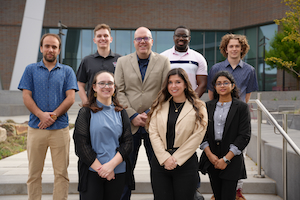
CCHT in Spring 2024.
This page describes the benefits of joining our team. After reading this information, if you are interested in being part of the CCHT at NC State University, then please submit an application for graduate studies. To be competitive, your application should discuss how your research interests align with the work being done in our department. Admission decisions will be based on the availability of funding and the quality of the applicant pool.
How You Will Fit
We are looking for students who are self-motivated, hard-working, and passionate about the coastal environment. The optimal CCHT member will have strong records of: success in undergraduate and graduate studies, analytical and writing abilities, English communication skills, and teamwork. The student will also have experience in some combination of (1) environmental fluid mechanics and coastal engineering, (2) numerical mathematics, and/or (3) programming for HPC environments. While most students will not have all three of these experiences, they should have some of them, and an eagerness to learn the others.
We are also looking for students who want to be part of a team. While CCHT members work on different projects, we have a shared focus on computational modeling for coastal hazards, and thus we are always looking for ways to help each other. In our laboratory, CCHT members help with writing Python scripts for processing model results, mapping and interpolating from geospatial data in GIS, designing and editing meshes in SMS, debugging codes in HPC environments, and initializing simulations for ADCIRC. We want our team to be better than the sum of our individuals.
What You Will Do
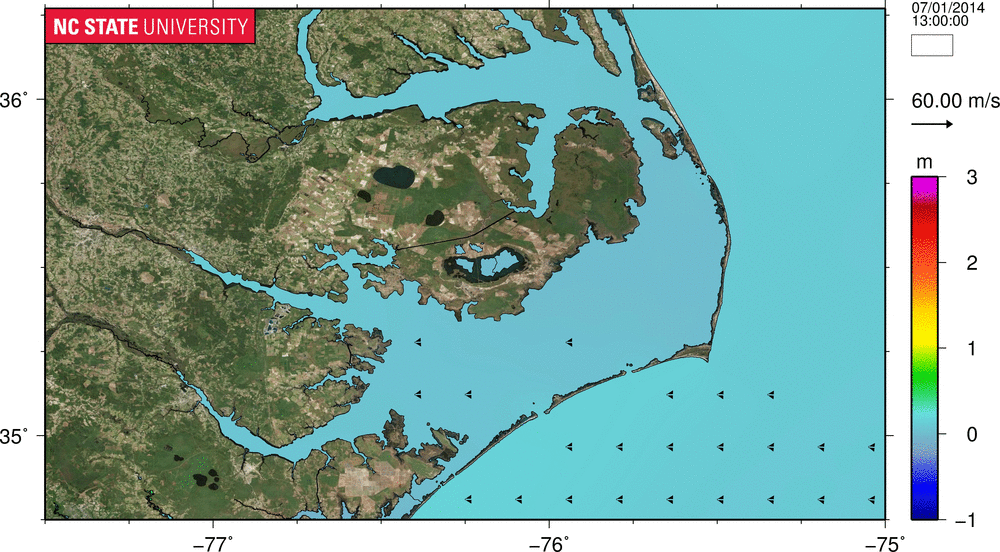
Contours of water levels (m) and vectors of wind velocities (m/s) during Hurricane Arthur (2011) in coastal North Carolina.
We are working on projects with three focus areas: (1) extending model capabilities, through the incorporation of additional physical processes, such as density-driven flows in estuaries and dune erosion on barrier islands; (2) improving model efficiency, through the use of modern techniques for parallel computing, so the resources are used optimally; and (3) communicating model results, through the integration of novel visualization techniques with the needs of end users. For more information about these projects, please see What We Do.
What You Will Learn
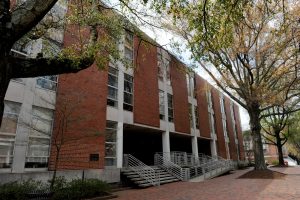
Mann Hall, home of the CCHT at NC State.
CCHT students can also design their own programs. In our department, graduate students must take at least 10 courses, but there is not a required list of courses. Students have the freedom to select courses that benefit their research program and career development. With their adviser and committee, the student design a plan of work by selecting courses in topics that are related to the research, fundamental to the discipline, or just plain interesting. For CCHT students, the plan of work may include courses in coastal engineering, numerical methods, geospatial analysis, and computational mathematics.
The following examples are courses that have been taken previously by CCHT students. There are several courses inside our department:
- Coastal engineering:
- CE 581 Fluid Mechanics in Natural Environments
- CE 583 Coastal Processes
- CE 596 Coastal Hydrodynamics
- CE 596 Coastal Modeling
- Computing for engineering:
- CE 537 Computer Methods and Applications
- CE 594 Finite Element Method
- CE 791 High-Performance Computing Modeling
CCHT students also benefit from course offerings across the university, including courses in marine science, geospatial information, and computational mathematics:
- Coastal environment:
- MEA 540 Principles of Physical Oceanography
- MEA 562 Marine Sediment Transport
- MEA 791 Ocean Circulation
- Geospatial information:
- GIS 510 Introduction to Geophysical Information Science
- GIS 540 Geospatial Programming Fundamentals
- MEA 582 Geospatial Modeling and Analysis
- Computational mathematics:
- MA 501 Advanced Mathematics for Engineers and Scientists
- MA 580 Numerical Analysis
- MA 587 Finite Element Method
- MAE 766 Computational Fluid Dynamics
This is just a sampling of courses in topics related to coastal engineering. Many other courses are offered at NC State. Students cannot include all of these courses into a plan of work, so it is important to select an appropriate subset of courses. The successful student will design a graduate program that builds strengths across disciplines and prepares for a meaningful career.
Where You Will Live
At NC State, our goal is to Think and Do. Our focus is on translating our education and research into programs that can help our communities in Raleigh, throughout North Carolina, and beyond.NC State is located in Raleigh NC, which is one of the fastest-growing urban centers in America. A top spot for young professionals and families, Raleigh was ranked No. 1 among the best places for business and careers, No. 1 among U.S. cities attracting the most families, No. 2 among U.S. cities for young professionals, and No. 3 among U.S. cities for college students. It was also selected as a Google Fiber expansion city. With Durham and Chapel Hill, Raleigh anchors the Research Triangle, a national hotspot for high-tech enterprise. Because the metro area is spread across three cities and their suburbs, it does not feel crowded in any single place, but it still offers the benefits of a large city. There is a large population of college graduates, a vibrant scene for the arts and dining, and affordable housing with convenient transportation. Raleigh is a great place to live and work.
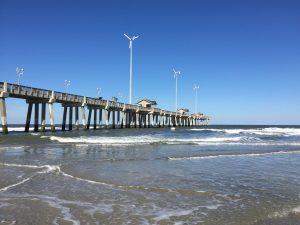
Jennette’s Pier in Nags Head NC.
The coast has a lot of fun opportunities, either for a weekend or a longer vacation. You can stay in a larger city like Wilmington, or you can escape to a natural island like Ocracoke. You can stay in a hotel or a bed-and-breakfast, rent a beach house, or camp near the beach. You can learn at the North Carolina Aquariums, go fishing from a pier or boat, play in the ocean, or relax on the beach. You can enjoy the local seafood. You can visit the historic lighthouses, or see where the Wright brothers made their first flight. You can experience the environment that our research is meant to protect. CCHT faculty and students have enjoyed our explorations of coastal North Carolina.
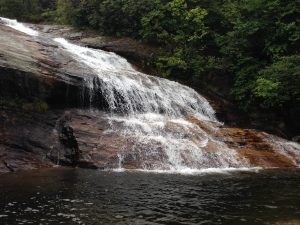
Upper Falls at Graveyard Fields along the Blue Ridge Parkway.


